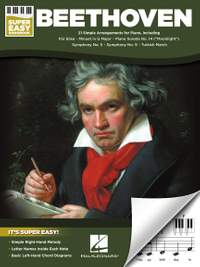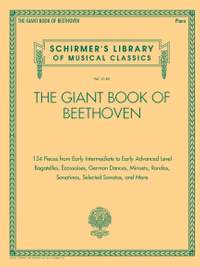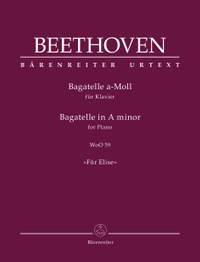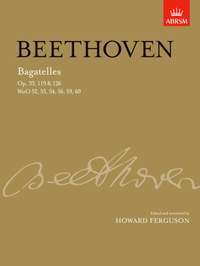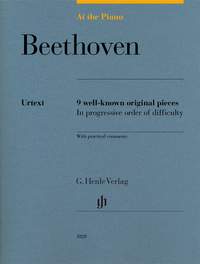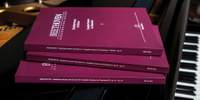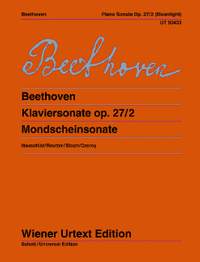Essential Repertoire,
Piano Sheet Music Essentials: Ludwig van Beethoven
Beethoven is unquestionably one of the most radical and innovative composers to have ever lived. A leading figure in the new Romantic age of music, his compositions are some of the most performed works in the classical music repertoire.
In our Piano Sheet Music Essentials series, we aim to offer recommendations for some of the most popular piano pieces by a selection of celebrated composers, broken up into general difficulty level, so pianists of all ages and abilities can begin to explore the works of great classical composers. This article focuses on the work of Ludwig van Beethoven, a remarkably talented pianist and composer of the late classical and early romantic eras.
Ludwig van Beethoven
 Born in Bonn, Germany in 1770, Ludwig van Beethoven grew to become a leading figure in the new romantic age. He first made his name as a virtuoso pianist, earning him the support of a number of wealthy noble admirers, which helped him to establish himself as a composer. In 1792 he moved to Vienna to study with Haydn, an exceptional composer of the classical era. Beethoven's compositions constantly surprised audiences with new and unexpected features, such as in his iconic Symphony No. 9 where the combination of vocal and instrumental music in the form of a symphony was extremely unorthodox at the time. Although he started to lose his hearing in his late twenties, and by 1818 was almost completely deaf, this did not stop his astonishing compositional output. Some of his most inventive and revolutionary works were composed in this period before his death in 1827, including the Missa solemnis and Diabelli Variations.
Born in Bonn, Germany in 1770, Ludwig van Beethoven grew to become a leading figure in the new romantic age. He first made his name as a virtuoso pianist, earning him the support of a number of wealthy noble admirers, which helped him to establish himself as a composer. In 1792 he moved to Vienna to study with Haydn, an exceptional composer of the classical era. Beethoven's compositions constantly surprised audiences with new and unexpected features, such as in his iconic Symphony No. 9 where the combination of vocal and instrumental music in the form of a symphony was extremely unorthodox at the time. Although he started to lose his hearing in his late twenties, and by 1818 was almost completely deaf, this did not stop his astonishing compositional output. Some of his most inventive and revolutionary works were composed in this period before his death in 1827, including the Missa solemnis and Diabelli Variations.
Easy - Intermediate Pieces
The pieces listed below are suitable for beginner to early intermediate pianists. As with all sheet music, some basic music theory and an understanding of how to read and interpret sheet music is required. Including some of the easiest works by Beethoven, alongside transcriptions of more difficult pieces, this collection provides accessible choices for beginners and offers an introduction into the world of Beethoven. The selections below include popular compositions such as Ode to Joy, and Turkish March.
Nineteen themes from Beethoven's symphonies, sonatas and other major works in easy piano arrangements for developing pianists. Includes Für Elise, Ode to Joy, Theme from Pathetique Sonata, Turkish March, and more.
Available Format: Sheet Music
Beginners can start their piano playing adventures with the classics of Ludwig van Beethoven with this beginning piano solo collection. Selections include Ecossaise in G Major, Für Elise, Ode to Joy, an excerpt from the first movement of Symphony No. 5 in C Minor, and more.
Available Format: Sheet Music
It's super easy! This series features accessible arrangements for piano, with simple right-hand melody, letter names inside each note, and basic left-hand chord diagrams. This edition includes twenty-one selections from legendary classical composer Ludwig van Beethoven.
Available Format: Sheet Music
This diverse collection contains dances by Ludwig van Beethoven. Each piece is presented in its original form with Beethoven's markings clearly indicated. Three portraits of the composer are provided, and Dr. Palmer's background material describes staccato and legato markings in the composer's works. Designed for intermediate-level pianists, this volume is excellent preparation for the study of Beethoven's sonatinas, bagatelles and easier variation sets.
Available Format: Sheet Music
Intermediate – Early Advanced Pieces
The following pieces are suitable for intermediate to early advanced pianists. Some publications will include pieces that are easier to master, and some that are much more advanced. Our selections below include popular works including Beethoven's Ecossaises, and Bagatelles.
This comprehensive volume contains 134 pieces from early intermediate to early advanced level, including Beethoven's complete bagatelles, various dances, sonatinas, selected variation sets, and some of his most popular sonatas.
Available Format: Sheet Music
A collection of Beethoven's piano works. Among these easy to intermediate pieces are original compositions as well as arrangements suitable for lessons and for playing at home. Für Elise, Moonlight Sonata, Ode to Joy and many more in one volume! Complete with fingerings and tempo suggestions, this collection with its modern and easy-to-read layout is ideal for all piano players.
Available Format: Sheet Music
A number of questions regarding Beethoven’s most famous bagatelle, Für Elise, remain unanswered: What happened to the complete autograph and who was Elise? The bagatelle was written between 1808 and 1810. It was first published in 1867 by the Beethoven scholar Ludwig Nohl who still had access to Beethoven’s autograph. What has survived, however, is an extensive autograph draft that Beethoven substantially revised around 1822 for a planned but then unrealised collection of bagatelles and which differs significantly from the known printed version.
Available Format: Sheet Music
A collection of dances by Beethove including Six Ecossaises, WoO 83, and Twelve German Dances, WoO 8 for piano solo.
Available Format: Sheet Music
Beethoven's Bagatelles are published as part of ABRSM's Signature Series - a series of authoritative performing editions of standard keyboard works, prepared from original sources by leading scholars. Includes informative introductions and performance notes.
Available Format: Sheet Music
Now including a CD with professional recordings of all the pieces, this sensational collection features pieces composed and arranged for solo piano by Beethoven. Contents include Adagio Cantabile (Sonata in C minor Pathetique, Op. 13), Adagio Sostenuto (Sonata in C-sharp minor 'Moonlight', Op. 27, No. 2), Fur Elise, and many more.
Available Format: Sheet Music/CD
Beethoven - At The Piano
Nine well-known original pieces in progressive order of difficulty with practical comments
Beethoven’s thirty-two piano sonatas are the 'New Testament' of music, according to Hans von Bülow. The selection here does not take things quite so solemnly, because Henle have also taken the opportunity to show the more "worldly” side of the composer, with dances, bagatelles, the unusual character piece Lustig und traurig (Happy and sad), and of course the indestructible Für Elise. All the pieces are arranged progressively from easy to medium level of difficulty.
Available Format: Sheet Music
Advanced – Professional Level Pieces
Lastly, these selections are most suited for advanced to professional level musicians, and includes some of the most challenging Beethoven compositions. The publications below include Beethoven's complete piano sonatas, and complete variations.
Following the critically acclaimed publication of the thirty-five piano sonatas in separate editions, Bärenreiter now presents Beethoven’s Complete Piano Sonatas in three volumes. This edition, which is unparalleled in terms of its philological accuracy, has been edited by world-renowned Beethoven expert Jonathan Del Mar, guaranteeing a musical text at the forefront of musicological scholarship. An indispensable standard work at the cutting edge of Beethoven scholarship!
Available Format: Sheet Music
The so-called Moonlight Sonata is probably the best known of all of Beethoven's piano sonatas, and one should think that all that can be said about this work has already been said. But far from it! Even this sonata shows problems in the surviving musical text into which the new edition looks very meticulously. This edition contains remarks of Beethoven's pupil Carl Czerny concerning the performance practice which introduce us into the poetic way of thinking, among others, that is behind the work and provides an essential impetus to a highly imaginative interpretation.
Available Format: Sheet Music
In a span of only eight years, between 1794–1802, Beethoven composed twenty piano sonatas, among them his so-called Grande Sonate Pathétique. It marks the consummation of his Classical style, yet also already alludes to his Heroic Period with its intensely Romantic characteristics. Composed in the “tragic” key of C minor, it foreshadows the expressive drama of later masterworks such as the Fifth Symphony or the Coriolan Overture. Of the famous sonatas, this one is the most technically manageable and thus proves immensely popular with advanced piano students.
Available Format: Sheet Music
Next to the Moonlight and the Waldstein Sonatas, the Appassionata is no doubt the most celebrated of Beethoven’s piano sonatas and claims, with the latter two works, a new high point in the composer’s piano oeuvre. Curiously, the nickname Appassionata appeared for the first time in 1838 in a transcription of the sonata for piano four-hands published by the Cranz Verlag in Hamburg, although this designation did not originate with Beethoven, it is nowadays inseparably connected with the work. It fits splendidly with the dramatic contrasts of the first movement, the solemnity and inwardness of the second, and the demonic passion of the third.
Available Format: Sheet Music
Beethoven’s Grande Sonate in C major, op. 53 marks his turn towards large-scale symphonic influenced piano works. Since its first publication this highly virtuosic piece, dedicated to Beethoven’s friend and patron Ferdinand, Count Waldstein, has lost none of its magnetism. To this day it remains a pianistic challenge and a musical touchstone for every performer.
Available Format: Sheet Music
This volume contains all twenty-one sets of Beethoven's solo piano variations, including the popular Diabelli Variations and Eroica Variations. Reprinted from the authoritative Breitkopf & Hartel edition.
Available Format: Sheet Music
More Beethoven Sheet Music Recommendations
Ludwig van Beethoven had the ability to create an entire musical universe from the most unassuming and minuscule motif. No classical composer worked more consciously with rhythm than Beethoven: his unmistakable “drive” can be felt in every bar! Here familiar “Beethoven themes” are merged, liberated, shuffled, filtered and recombined with jazz harmonies, standard styles and rhythms. Jean Kleeb’s arrangements sometimes closely follow the original, at other times they comment on or recall Beethoven’s music from afar.
Available Format: Sheet Music




